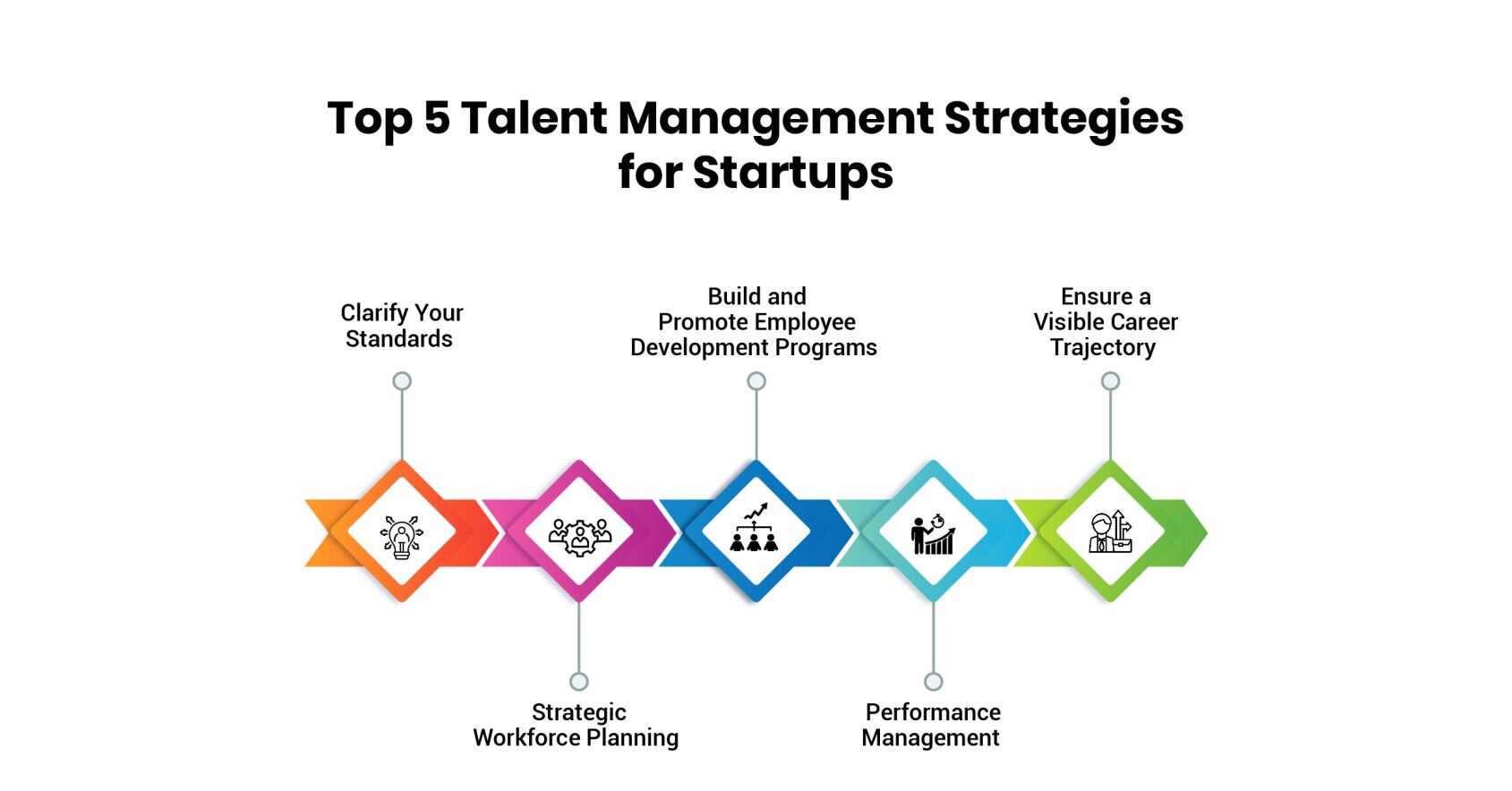
The battleground for talent acquisition and retention has never been more intense. Businesses today aren't just seeking talent; they're on a mission to secure and empower the best. As the Federation of Small Businesses discloses a startling revelation—80% of small firms grappling with the struggle to find skilled applicants—the narrative of talent acquisition has altered since the past decade. Particularly for startups, where every resource is precious.
Effective talent management strategies for start-ups are even more critical. In a competitive market, attracting and retaining top talent can be the key differentiator between success and failure. In this article, we will delve into the world of talent management and explore why startups need to prioritize it for their long-term success.
What Is Meant by Talent Management?
Before jumping to how talent management strategies for startups are highly important, let’s first understand what talent management means.
Talent management goes beyond mere recruitment and extends to the holistic approach of acquiring, developing, and retaining skilled individuals within an organization. It encompasses a set of processes aimed at maximizing the potential of employees, aligning their skills with organizational goals, and nurturing their professional growth throughout their tenure. By employing effective talent management strategies, organizations can cultivate high-performing teams and nurture employee engagement and motivation.
Understanding Talent Management Strategy
A talent management strategy is a roadmap that outlines how an organization will attract, develop, and retain its workforce to achieve strategic business objectives. In a startup, talent management strategies encompass the responsibilities of overseeing recruitment processes and ensuring employee retention. Essentially, these strategies involve overseeing the entire employee life cycle, ranging from establishing the company's culture, internal policies, and benefits to managing the departure of employees.
This strategic approach helps organizations create a thriving work environment that fosters innovation, collaboration, and overall success.
What Makes Talent Management Crucial for Startups?
For startups, the multitude of tasks often makes it tempting to overlook, postpone, or neglect talent management strategies. While attracting and hiring tech talent is one challenge, effectively managing these individuals to prevent employee turnover is another critical aspect. A robust talent management strategy not only ensures that startups have the right people in place but also helps in:
- Enhancing Performance: Effective talent management ensures that a startup recruits talented individuals and manages them optimally, resulting in superior overall company performance.
- Reducing Employee Turnover: Talent management strategies play a crucial role in minimizing employee turnover, a costly issue for startups. This not only preserves brand identity but also contributes to sustained and improved organizational performance.
- Increasing Work Output: Thoughtful talent management strategies for startups communicate to employees that they are valued, boosting morale and highlighting their contributions. This leads to heightened work output as individuals feel appreciated and recognized.
- Employee Commitment: A well-executed talent management approach fosters a strong commitment among employees to perform well and contribute to the startup's success, creating a positive and motivated work environment.
-
Attracting Tech Talents: Satisfied employees become advocates for the company, spreading positive word-of-mouth within professional networks. This, in turn, attracts more tech talents as skilled individuals are drawn to join a startup with a reputation for a supportive and thriving work culture.
Top 5 Talent Management Strategies for Startups
In a startup, talent management encompasses the responsibilities of overseeing recruitment processes and ensuring employee retention. It involves proactive planning to ensure that the right people are in the right roles at the right time.
Here are top 5 talent management strategies for startups that will help them create a thriving work environment that fosters innovation, collaboration, and overall success.

- Clarify Your Standards
For startups, there may be a temptation to compromise on standards to quickly fill job vacancies and set the company in motion. However, this short-term gain can lead to long-term harm as it may not align with the organization's needs.
The optimal approach is to set clear standards right from the beginning. This involves defining the roles within the teams and establishing stringent criteria for the necessary skills and experience levels crucial for the startup's success. Once these requirements for various roles are outlined, it becomes imperative to steadfastly uphold these standards without compromising on them.
- Strategic Workforce Planning
Next you must start by identifying the skills and competencies essential for achieving business goals. Develop a roadmap to acquire, develop, and deploy talent strategically. Strategic workforce planning is a pivotal talent management strategy for startups, involving a forward-looking approach to align workforce capabilities with business objectives. In a dynamic startup environment, this strategy ensures that the right talent is available at the right time to meet evolving business needs. It involves forecasting future skill requirements, identifying gaps, and implementing proactive recruitment and development initiatives. This approach empowers startups to proactively address talent challenges, fostering sustainable growth and a resilient organizational structure in the competitive business landscape.
- Build and Promote Employee Development Programs
You must invest in training and development programs that empower employees to enhance their skills and contribute more effectively to the organization's success.
As per the Association of Talent Development, companies that provide comprehensive learning and development programs experience a remarkable 218% higher income per employee compared to those lacking formalized training. This outcome underscores the significance of aligning learning and development initiatives with the objectives of a startup. Instilling a culture of continual improvement in your business ensures that your team consistently acquires new skills, remaining competitive in the process.
- Performance Management
Establishing meaningful performance metrics stands as a key method to ensure the effectiveness of talent management strategies that foster a culture of accountability and continuous improvement. These metrics should be specific, attainable, and subject to regular review and adjustments when necessary. It is imperative to monitor performance across multiple facets, including employee performance, job satisfaction, and retention rates. This comprehensive approach provides businesses with the insights necessary to enhance talent management strategies and yield improved outcomes. Furthermore, this software came out as an effective talent management strategy for startups, by consolidating pertinent performance data from diverse talent management systems.
-
Ensure a Visible Career Trajectory Addressing the challenge of limited growth opportunities is crucial for retaining talent in startups. Individuals seek a clear career path, and businesses lacking such trajectories risk losing employees in search of clarity about their professional futures. Startups, inherently adaptable and dynamic, may not have a clearly defined business trajectory, complicating employee career envisioning. Inspire your team with fresh challenges. Emulate Google's model, encouraging employees to invest 20% of their time in projects benefiting the company. Google attributes major successes to this innovative approach, fostering creativity and significant advances. This talent management strategy will not only fuel individual growth but also cultivate a dynamic and forward-thinking organizational culture.
End Note
In conclusion, talent management is not a luxury but a necessity for startups aiming for long-term success. By investing in well-crafted talent management strategies, startups can build a resilient and agile workforce, positioning themselves for sustained growth and innovation. The journey from startup to success is challenging, but with the right talent management approach, organizations can turn their human capital into a powerful asset that propels them to new heights in the competitive business landscape.



